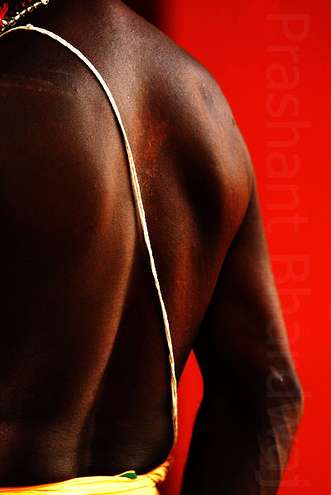FWP:
SETS == MUSHAIRAH
CHAK-E GAREBAN: {17,9}
MADNESS: {14,3}
RELIGIONS: {60,2}
The first line is piquant and even a little shocking: because of the speaker's madness, he doesn't even have on his shoulder a 'sacred thread' [zunnār] such as Brahmins wear (on this term see {60,8}). The implication is that if the lover were not so extremely mad, he certainly would have such a sacred thread on his shoulder. Such a thread, of course, would mark him as an infidel, an idolater, a Brahmin. (In the ghazal world, no other Hindu caste groups exist except Brahmins, since they alone are needed for symbolic purposes like this.) Under mushairah performance conditions, the listeners would have to contain their curiosity for a bit before being allowed to hear the second line.
At the beginning of the second line, 'that is' [yaʿnī] makes it clear that the second line is to be taken as a paraphrase or explanation of the first one. 'That is', not a single thread remained in the lover's collar-opening. The word jeb also means 'pocket', as in a slash pocket, but here refers to the vertical 'slash' neckline of a kurta. The lover has done such an exhaustive job of collar-ripping [chāk-e garebāñ] that not even a single thread remains. (For more on this concept, and on the word jeb , see {17,9}.)
When the two lines are put together, what is striking is the strength of the equation: the presence (or absence) of a remaining thread or two of the lover's torn collar is completely identified with the presence (or absence) of a sacred thread. If there were even a single thread left of his collar, it would be a Brahminical sacred thread; and its absence seems astonishing-- note the double use of 'even' [bhī]. In short, there's no gap at all here between the lover's practice and the Brahminical practice. But, in true mushairah-verse style, we don't learn that until the last possible moment: until we hear the crucial word 'thread' [tār], we can't make any sense of the verse-- and that word is deferred until the very end, which enhances its 'punch'.
This conflation of the lover's worship of the beloved, the
'idol' [but , ṣanam], with the
worship practices of other and (Islamically speaking) 'idolatrous' religions,
is a commonplace of the ghazal world. It can always be taken mystically, as
well: it can suggest that the lover's passion transcends the mere external
rituals of conventional religious practice, and brings him mystically into the
real presence of the one God.

Nazm:
He says, the style of my madness is that I didn't leave even one thread remaining in my collar [garebāñ], such that it would have been in place of a sacred thread and would not have been contrary to my practice of idol-worship. (120)b
== Nazm page 120